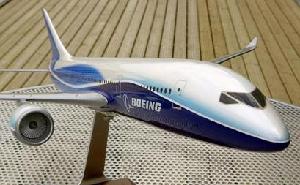|
Washington's $3.2B deal that won Boeing over December 17, 2003
Were the giveaways necessary? Gov. Gary Locke, business and community leaders and key decision-makers in both parties say the state’s eye-popping incentive package — and its scrappiness in competing for the big economic development prize — likely made the difference.
Boeing Commercial Airplanes President Alan Mulally said while the tax breaks and other incentives helped even the playing field for Washington, the company didn’t blackmail the state. “It was absolutely not a threat,” Mulally said Tuesday. “It was dealing with today’s reality.” Just two years after Boeing moved its corporate headquarters to Chicago, the company’s original homestate won the bidding war for the 7E7 assembly. Boeing announced Tuesday that it will begin taking orders for its first all-new jet in 13 years. If the company decides to proceed with the 7E7, it will be built in Everett. Locke called the breathtaking $3.2 billion tax package he rushed through an eager Legislature last summer a “big gulp.” Boeing has always enjoyed favorable tax treatment and deference in Olympia, but never had the state chased jobs so aggressively or so expensively. Critics said it might have been a big mistake, throwing so much cash at a company that might well have chosen Washington anyway, given that the bulk of Boeing’s skilled workers are here and Everett has so many obvious attributes. But Locke was having none of that second-guessing. He hailed the state’s “creative, compelling and economic” sales pitch, and declared “This should be a sign to companies all around the world that Washington is open for business in a way we never have been before.” Without the sweeteners, Boeing would have flown away, he said. “Boeing is driven by the bottom line,” he added. It was the biggest tax giveaway to a single industry in state history, spurred by Locke’s insistence that the state’s aerospace future was at stake. The industry is the lynchpin of the state’s manufacturing sector, with about 55,000 direct jobs and twice that many in spinoff jobs. The average Boeing job pays $55,000. Locke said the state stood to lose 150,000 jobs over 20 years and $540 million in annual revenue if the industry shriveled as Boeing models became obsolete and successor lines were built elsewhere. The Legislature was quickly caught up in Locke’s sense of urgency. Capping a so-called “Boeing Session,” the Legislature voted overwhelmingly for a series of tax incentives and other sweeteners. The tax breaks were to apply only if the plane were assembled in Everett or Moses Lake. The deal will save Boeing and others in the aerospace industry about $120 million a year once assembly is in full swing, possibly in 2007. A few critics, including Democratic gubernatorial candidate Phil Talmadge and some labor activists, questioned singling one company out for such a windfall. Conservatives backed the plan, but said other businesses need similar relief. Theoretically, the $3.2 billion giveaway will erase revenue that could be spent on health care for Washington’s poor and education for its children. But that assumes that Boeing would have stayed here without the tax breaks — speculative, given that the company showed little evidence of sentimentality. The state assumes the 7E7 project, with its 800 to 1,200 direct jobs, would create 17,300 jobs if suppliers and spinoff jobs are included. Locke said losing the 7E7 and a resulting decline in aerospace would have cost $200 million to $475 million in taxes each year. Details of the $3.2B deal
|
